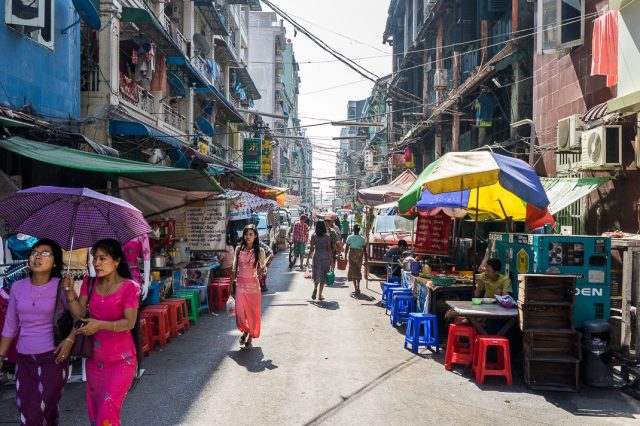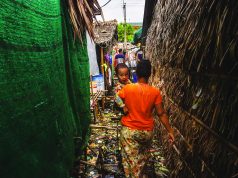If you ask 100 people on in Yangon about the lack of cleanliness in the capital city, I bet 100% of them would say it’s due to lack of discipline and street vendors. The first part I would say lack of enforcement, rather than lack to discipline. People need strict enforcement to reinforce discipline in them. Who would possibly think that people who behave in such a disciplined way in Singapore, would conduct themselves in a similar manner overseas? The high penalties and $ fines could not conceivably be the reason, could it?
Now we go into the issue of the street vendors. I once sat together in the same table with the previous Mayor of Yangon, U Hla Myint and posed this question to him: what is the most difficult issue that you have to deal with as a Mayor? The answer given to me was ‘the issue of street hawkers’. They are everywhere in every part of Yangon, from little back streets to the main roads. And most of them are selling food. The ugliest thing about food sellers is the food waste and the mess that they leave behind.
Go around central Yangon, townships such as Pabedan, Kyauk Ta Dar, Lan Ma Taw, etc., and you cannot help but notice lack of hygienic practices and the habit of throwing away whatever waste onto nearby area or into whatever little drain or hole that they could find. Most of the streets colonised by these food stalls display unsightly arrays of nasty rubbish, threatening both health and safety issue for the whole city population.
This behaviour is both unethical and unjust. How can they earn all the profit from their sale, but the cost of cleaning up their horrible leftovers have to be born by the residents and the local government (YCDC)? Every six months or so, YCDC (Yangon City Development Council) would ask residents for their contributions for clean up the streets, the back streets, the rats, the cockroaches, etc. But most of the mess that caused the infestation of these lovely creatures is not mainly due to actions of the residents. So, they have to pay for the negative externalities brought about by street hawkers.
We have not even started talking about the diseases such as Cholera, Typhoid or Plague yet. As recent as a couple of months ago, street vendors in Thar Kay Ta township were told to close their roadside food stalls for at least two months, because the source of cholera pandemic in the neighbourhood was traced back to them.
Contrast that with our neighbouring Thailand please. They do have street vendors like us. But the the streets remain relatively clean as there is enforcement to ensure that these roadside hawkers clean up their mass at day’s end.
Now even Thailand is tightening up its grip on the regulations governing road side stalls. Based on new Bangkok city council rules governing street vendors, only economically deficient Thai nationals would be allowed to ply on this trade. Specifically, migrant workers would be prohibited from working on these stalls, obviously targeting Myanmar migrants, who are at the top of both legal and illegal migration list in Thailand.
These vendors would also be forbidden from venturing out into pedestrian walkways. These Thai citizen vendors would have to apply for permit from public health authorities and they can deploy for an additional helper at their store. It was not clear from the announcement if the helper also have to be a Thai citizen. The rules also specified the maximum dimensions that the stalls can have and the areas that they can station relative to the size of the roads and walkways.
Its high time YCDC update its rules on roadside food stalls across Yangon and begin strict enforcement of these rules, for the cleaner, brighter and safer Yangon.










